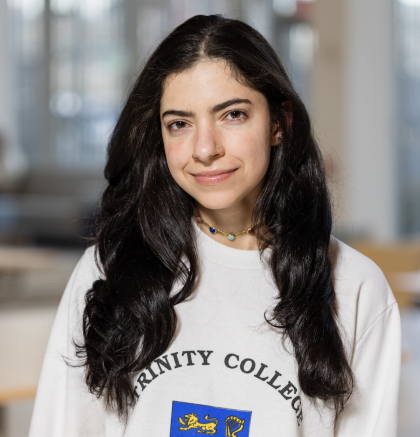Isabel Plakas, a master's student at the Johns Hopkins School of Nursing, has been named a Mitchell Scholar, the first from Hopkins in over a decade.
Plakas is one of 12 students selected for the George J. Mitchell Scholar Class of 2025. Sponsored by the U.S.-Ireland Alliance, the highly competitive fellowship provides funding for future American leaders to pursue graduate studies in Ireland. Plakas plans to study Addiction Recovery at Trinity College Dublin.

Plakas' interests lie particularly in harm reduction, which refers to public health practices that minimize negative health impacts on people who use drugs, such as overdose prevention sites and needle exchanges. Though the concept of harm reduction has only recently gained widespread recognition in the United States, Plakas has been involved in the practice for years.
"I'd been doing harm reduction work before I even knew there was a name for it," she says. "During college, I worked with people who do sex work in Spain, and when I came back [to the U.S.], I took a class my senior year on the overdose crisis that really focused on harm reduction. That was my first introduction to it, and I immediately was in love with the concept."
As an undergraduate at Bryn Mawr, Plakas put her knowledge into practice by working in harm reduction with vulnerable populations in Philadelphia, which ultimately led her to become a full-time harm reduction specialist in Boston. There, she worked at Boston Health Care for the Homeless Program, running a mobile medical unit that provided medical care and case management services at overdose hot spots in Boston. During her time at BHCHP, she spearheaded the development of youth-specific programming, which led to her receiving a 2022 Individual Achievement Award. That same year, she worked across the street, helping build harm reduction programming at a novel transitional shelter site for homeless individuals that also served as a 24/7 overdose monitoring unit-–a project that was awarded the Be Exceptional Award by the Boston Medical Center.
Now, as a nursing student, she's pulling triple duty as a student, advocate, and practitioner of harm reduction: While attending class and clinicals to learn how to employ harm reduction strategies within the field of nursing, she also serves as co-president of Nursing Students for Harm Reduction at Hopkins, teaches an undergraduate course on harm reduction, and works at Sex Workers Promoting Action, Risk Reduction and Community Mobilization (SPARC), a drop-in center for female and nonbinary sex workers in southwest Baltimore.
School of Nursing lecturer Meredith Kerr, who previously taught Plakas, also works in harm reduction and is impressed by Plakas' dedication to the cause.
"With a deep understanding of harm reduction strategies, Isabel consistently employs non-judgmental approaches to educate and empower patients, fostering trust and rapport within the community," Kerr says. "Her unwavering commitment to harm reduction principles and advocacy for accessible healthcare services makes her an invaluable asset in promoting health equity and saving lives."
Plakas says she is excited to begin her studies in the fall at Trinity College, which hosts a one-of-its-kind master's in addiction recovery.
"Most master's programs related to the field of addiction are more counseling based, or in the realm of therapy or mental health, but I wanted something more broad," Plakas says.
She says she's also interested in seeing how international communities approach harm reduction: "I hope to have a better understanding of how people internationally respond to the overdose crisis, because I know that even on a local level, it's done differently within harm reduction organizations. I worked in Boston and Philly, and now I'm in Baltimore, and there are so many differences—and so much to learn and so much information to exchange. I'm looking forward to seeing firsthand how it's done in Ireland and elsewhere in Europe and the UK."
Plakas says she hopes to return to the United States equipped with a deeper understanding of harm reduction and new strategies to implement.
"I recently discovered a love for labor and delivery during my most recent nursing clinical," she says. There's a lot of overlap [with nursing and harm reduction] because you have birthing parents with substance use disorder. There's so much stigma with parents who use drugs, especially mothers. And so I would love to come back and continue working in that field with more of a harm reduction lens, to help establish that kind of programming where it doesn't exist."
Students interested in applying to nationally competitive fellowships and grants should reach out to the Johns Hopkins National Fellowships Program. The NFP guides students and alums through application processes for programs including the Fulbright U.S. Student Program grants, U.K./Ireland Scholarships, Goldwater Scholarship, Truman Scholarship and other awards that have endorsement or nomination processes. Applicants may also receive assistance with their materials for the NSF Graduate Research Fellowship Program, the P.D. Soros Fellowship for New Americans, and many other awards.
Posted in University News, Student Life
Tagged scholarships







